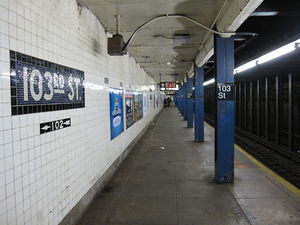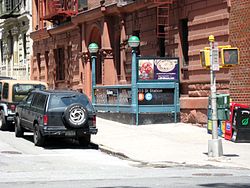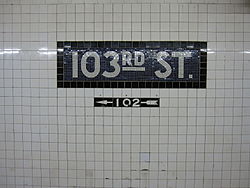103rd Street station (IND Eighth Avenue Line)
103 Street | |||||||||||||||||||||||||||||||||||||||||||||||||||||||||||||||||||||||||||||||||||||||||||||||||||||||||||||||||||||||||||||||||||||||||||||||||||||||||||||||||||||||||||||||||||||||
|---|---|---|---|---|---|---|---|---|---|---|---|---|---|---|---|---|---|---|---|---|---|---|---|---|---|---|---|---|---|---|---|---|---|---|---|---|---|---|---|---|---|---|---|---|---|---|---|---|---|---|---|---|---|---|---|---|---|---|---|---|---|---|---|---|---|---|---|---|---|---|---|---|---|---|---|---|---|---|---|---|---|---|---|---|---|---|---|---|---|---|---|---|---|---|---|---|---|---|---|---|---|---|---|---|---|---|---|---|---|---|---|---|---|---|---|---|---|---|---|---|---|---|---|---|---|---|---|---|---|---|---|---|---|---|---|---|---|---|---|---|---|---|---|---|---|---|---|---|---|---|---|---|---|---|---|---|---|---|---|---|---|---|---|---|---|---|---|---|---|---|---|---|---|---|---|---|---|---|---|---|---|---|---|
 Downtown platform on lower level | |||||||||||||||||||||||||||||||||||||||||||||||||||||||||||||||||||||||||||||||||||||||||||||||||||||||||||||||||||||||||||||||||||||||||||||||||||||||||||||||||||||||||||||||||||||||
| Station statistics | |||||||||||||||||||||||||||||||||||||||||||||||||||||||||||||||||||||||||||||||||||||||||||||||||||||||||||||||||||||||||||||||||||||||||||||||||||||||||||||||||||||||||||||||||||||||
| Address | West 103rd Street & Central Park West New York, New York | ||||||||||||||||||||||||||||||||||||||||||||||||||||||||||||||||||||||||||||||||||||||||||||||||||||||||||||||||||||||||||||||||||||||||||||||||||||||||||||||||||||||||||||||||||||||
| Borough | Manhattan | ||||||||||||||||||||||||||||||||||||||||||||||||||||||||||||||||||||||||||||||||||||||||||||||||||||||||||||||||||||||||||||||||||||||||||||||||||||||||||||||||||||||||||||||||||||||
| Locale | Upper West Side | ||||||||||||||||||||||||||||||||||||||||||||||||||||||||||||||||||||||||||||||||||||||||||||||||||||||||||||||||||||||||||||||||||||||||||||||||||||||||||||||||||||||||||||||||||||||
| Coordinates | 40°47′46″N 73°57′41″W / 40.79604°N 73.96142°W | ||||||||||||||||||||||||||||||||||||||||||||||||||||||||||||||||||||||||||||||||||||||||||||||||||||||||||||||||||||||||||||||||||||||||||||||||||||||||||||||||||||||||||||||||||||||
| Division | B (IND)[1] | ||||||||||||||||||||||||||||||||||||||||||||||||||||||||||||||||||||||||||||||||||||||||||||||||||||||||||||||||||||||||||||||||||||||||||||||||||||||||||||||||||||||||||||||||||||||
| Line | IND Eighth Avenue Line | ||||||||||||||||||||||||||||||||||||||||||||||||||||||||||||||||||||||||||||||||||||||||||||||||||||||||||||||||||||||||||||||||||||||||||||||||||||||||||||||||||||||||||||||||||||||
| Services | A B C | ||||||||||||||||||||||||||||||||||||||||||||||||||||||||||||||||||||||||||||||||||||||||||||||||||||||||||||||||||||||||||||||||||||||||||||||||||||||||||||||||||||||||||||||||||||||
| Transit | |||||||||||||||||||||||||||||||||||||||||||||||||||||||||||||||||||||||||||||||||||||||||||||||||||||||||||||||||||||||||||||||||||||||||||||||||||||||||||||||||||||||||||||||||||||||
| Structure | Underground | ||||||||||||||||||||||||||||||||||||||||||||||||||||||||||||||||||||||||||||||||||||||||||||||||||||||||||||||||||||||||||||||||||||||||||||||||||||||||||||||||||||||||||||||||||||||
| Levels | 2 | ||||||||||||||||||||||||||||||||||||||||||||||||||||||||||||||||||||||||||||||||||||||||||||||||||||||||||||||||||||||||||||||||||||||||||||||||||||||||||||||||||||||||||||||||||||||
| Platforms | 2 side platforms (1 on each level) | ||||||||||||||||||||||||||||||||||||||||||||||||||||||||||||||||||||||||||||||||||||||||||||||||||||||||||||||||||||||||||||||||||||||||||||||||||||||||||||||||||||||||||||||||||||||
| Tracks | 4 (2 on lower level, 1 on upper level, 1 on ramp from upper to lower level) | ||||||||||||||||||||||||||||||||||||||||||||||||||||||||||||||||||||||||||||||||||||||||||||||||||||||||||||||||||||||||||||||||||||||||||||||||||||||||||||||||||||||||||||||||||||||
| Other information | |||||||||||||||||||||||||||||||||||||||||||||||||||||||||||||||||||||||||||||||||||||||||||||||||||||||||||||||||||||||||||||||||||||||||||||||||||||||||||||||||||||||||||||||||||||||
| Opened | September 10, 1932[2] | ||||||||||||||||||||||||||||||||||||||||||||||||||||||||||||||||||||||||||||||||||||||||||||||||||||||||||||||||||||||||||||||||||||||||||||||||||||||||||||||||||||||||||||||||||||||
| Opposite- direction transfer | Yes | ||||||||||||||||||||||||||||||||||||||||||||||||||||||||||||||||||||||||||||||||||||||||||||||||||||||||||||||||||||||||||||||||||||||||||||||||||||||||||||||||||||||||||||||||||||||
| Traffic | |||||||||||||||||||||||||||||||||||||||||||||||||||||||||||||||||||||||||||||||||||||||||||||||||||||||||||||||||||||||||||||||||||||||||||||||||||||||||||||||||||||||||||||||||||||||
| 2023 | 1,033,211[3] | ||||||||||||||||||||||||||||||||||||||||||||||||||||||||||||||||||||||||||||||||||||||||||||||||||||||||||||||||||||||||||||||||||||||||||||||||||||||||||||||||||||||||||||||||||||||
| Rank | 289 out of 423[3] | ||||||||||||||||||||||||||||||||||||||||||||||||||||||||||||||||||||||||||||||||||||||||||||||||||||||||||||||||||||||||||||||||||||||||||||||||||||||||||||||||||||||||||||||||||||||
| |||||||||||||||||||||||||||||||||||||||||||||||||||||||||||||||||||||||||||||||||||||||||||||||||||||||||||||||||||||||||||||||||||||||||||||||||||||||||||||||||||||||||||||||||||||||
| |||||||||||||||||||||||||||||||||||||||||||||||||||||||||||||||||||||||||||||||||||||||||||||||||||||||||||||||||||||||||||||||||||||||||||||||||||||||||||||||||||||||||||||||||||||||
| |||||||||||||||||||||||||||||||||||||||||||||||||||||||||||||||||||||||||||||||||||||||||||||||||||||||||||||||||||||||||||||||||||||||||||||||||||||||||||||||||||||||||||||||||||||||
| |||||||||||||||||||||||||||||||||||||||||||||||||||||||||||||||||||||||||||||||||||||||||||||||||||||||||||||||||||||||||||||||||||||||||||||||||||||||||||||||||||||||||||||||||||||||
| |||||||||||||||||||||||||||||||||||||||||||||||||||||||||||||||||||||||||||||||||||||||||||||||||||||||||||||||||||||||||||||||||||||||||||||||||||||||||||||||||||||||||||||||||||||||
The 103rd Street station is a local station on the IND Eighth Avenue Line of the New York City Subway. Located at West 103rd Street and Central Park West on the Upper West Side, it is served by the B on weekdays, the C train at all times except nights, and the A train during late nights only.
History
[edit]New York City mayor John Francis Hylan's original plans for the Independent Subway System (IND), proposed in 1922, included building over 100 miles (160 km) of new lines. On December 9, 1924, the New York City Board of Transportation (BOT) gave preliminary approval for the construction of the IND Eighth Avenue Line.[4] The BOT announced a list of stations on the new line in February 1928, with a local station at 102nd Street.[5]
The finishes at the five stations between 81st Street and 110th Street were 18 percent completed by May 1930.[6] By that August, the BOT reported the Eighth Avenue Line was nearly completed and the five stations from 81 to 110 were 99 percent completed.[7] A preview event for the new subway was hosted on September 8, 1932, two days before the official opening.[8][9] The 103rd Street station opened on September 10, 1932, as part of the city-operated IND's initial segment.[10] Construction of the whole line cost $191.2 million (equivalent to $4,269.8 million in 2023).
Station layout
[edit]| Ground | Street level | Exit/entrance |
| Basement 1 | Northbound express | ← |
| Northbound local | ← ← ← | |
| Side platform | ||
| Mezzanine | Fare control, station agent, MetroCard and OMNY machines | |
| Basement 2 | Southbound express | |
| Southbound local | | |
| Side platform | ||


This underground station has two levels with northbound trains using the upper level and southbound trains using the lower one. Each level has one side platform to the west of two tracks.[11]
Both platforms have no trim line, but name tablets read "103RD ST." in white sans-serif lettering on a midnight blue background and black border. Small black "103" signs with white numbering run along the tiles at regular intervals and directional signs in the same style are below the name tablets. Blue columns run along both platforms at regular intervals with every other one having the standard black station name plate in white numbering.
Within this station, the northbound express track descends to allow the northbound local to cross over it, before rising up at 110th Street, where the line becomes the standard four tracks side by side with the local tracks on the side and express tracks in the center.[11]
The IRT Lenox Avenue Line passes underneath this station at the extreme north end on West 104th Street to Central Park North–110th Street. The line is not visible from the platforms. On the east side of Central Park West and West 104th Street, adjacent to Central Park, is an emergency exit enclosed in a small brick house for the IRT line, which passes underneath the station. From here the line curves northeast, running directly under Central Park's North Woods at this point.
Exit
[edit]This station has one fare control area at the center of the upper-level platform. A single staircase connects the two platforms before a turnstile bank leads to a token booth and one staircase going up to the northwest corner of West 103rd Street and Central Park West. The station is unique in that it has only one open staircase to street level.[12]
Directional signs that have been covered indicate that there were two more fare control areas. One exit at the extreme south end had two staircases going to southwestern corner of West 102nd Street and Central Park West, and the other at the extreme north end had two that went to both western corners of West 104th Street.[13] Further evidence of these exits' existences includes new tiling on both levels, and doorways that lead to converted storage spaces on the upper level. The fare control area with stairs to West 104th Street was closed by 1940[14] and possibly as early as November 1932 - just two months after the opening of the station - due to frequent vandalism.[15]
References
[edit]- ^ "Glossary". Second Avenue Subway Supplemental Draft Environmental Impact Statement (SDEIS) (PDF). Vol. 1. Metropolitan Transportation Authority. March 4, 2003. pp. 1–2. Archived from the original (PDF) on February 26, 2021. Retrieved January 1, 2021.
- ^ "List of the 28 Stations on the New 8th Av. Line". The New York Times. September 10, 1932. p. 6. ISSN 0362-4331. Archived from the original on May 2, 2021. Retrieved April 21, 2020.
- ^ a b "Annual Subway Ridership (2018–2023)". Metropolitan Transportation Authority. 2023. Retrieved April 20, 2024.
- ^ "Hylan Subway Plan Links Four Boroughs at $450,000,000 Cost". The New York Times. December 10, 1924. p. 1. ISSN 0362-4331. Archived from the original on June 14, 2018. Retrieved June 29, 2018.
- ^ "Express and Local Stations For New Eighth Avenue Line". New York Herald Tribune. February 5, 1928. p. B1. ISSN 1941-0646. ProQuest 1113431477.
- ^ "Progress is Rapid on 8th Av. Subway; Board's Engineers Report Spurt in Building Is Likely to Open the Line in July, 1930". The New York Times. May 26, 1930. ISSN 0362-4331. Retrieved April 29, 2023.
- ^ "Eighth Av. Subway Nearly Completed; Basic Construction Work From Chambers to 207th St. Done Except on Few Short Stretches". The New York Times. August 24, 1930. ISSN 0362-4331. Retrieved March 15, 2023.
- ^ "Sightseers Invade New Subway When Barricade Is lifted". The New York Times. September 9, 1932. ISSN 0362-4331. Archived from the original on July 1, 2022. Retrieved July 1, 2022.
- ^ "8th Av. Subway Gets First 5c. by Woman's Error: She Peers Into a Station, Hears Train, Pays for Ride, but Is Day Too Early Preparing for Tomorrow's Rush on 8th Ave. Subway". New York Herald Tribune. September 9, 1932. p. 1. ProQuest 1125436641.
- ^ Crowell, Paul (September 10, 1932). "Gay Midnight Crowd Rides First Trains In The New Subway: Throngs at Station an Hour Before Time, Rush Turnstiles When Chains are Dropped" (PDF). The New York Times. Retrieved November 8, 2015.
- ^ a b Dougherty, Peter (2006) [2002]. Tracks of the New York City Subway 2006 (3rd ed.). Dougherty. OCLC 49777633 – via Google Books.
- ^ "MTA Neighborhood Maps: Upper West Side" (PDF). mta.info. Metropolitan Transportation Authority. 2015. Archived (PDF) from the original on November 23, 2018. Retrieved December 30, 2016.
- ^ Review of the A and C Lines (PDF) (Report). Metropolitan Transportation Authority. December 11, 2015. Archived from the original (PDF) on February 3, 2020. Retrieved January 19, 2016.
- ^ "1940s NYC | Street photos of every building in New York City in 1939/1940". Archived from the original on September 13, 2022. Retrieved January 26, 2021.
- ^ "Archived copy". Archived from the original on May 12, 2020. Retrieved January 26, 2021.
{{cite web}}: CS1 maint: archived copy as title (link)
External links
[edit]- nycsubway.org – IND 8th Avenue: 103rd Street Archived May 11, 2012, at the Wayback Machine
- Station Reporter – B Train
- Station Reporter – C Train
- The Subway Nut - 103rd Street Pictures Archived June 29, 2017, at the Wayback Machine
- 103rd Street entrance from Google Maps Street View
- Uptown Platform from Google Maps Street View


 French
French Deutsch
Deutsch


